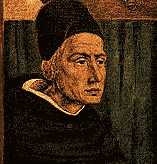November 15: Albert the Great
Albertus Magnus (d. 1280)
It was on this date, November 15, 1280, that Albertus Magnus or Albert the Great, died at Cologne, in what is now Germany. Albert was born about 1206, the son of the Count of Bollstädt, and made his early studies at the University of Padua, where Latin translations from Greek of Aristotle, and where the science of such Arab Aristotelians as Avicenna (960-1017) and Averroës (1126-1198), were well known – and original work by non-Arab scientists, except for Albert's contemporary and intellectual superior, Roger Bacon (1214-1292), was unknown.
Albert is often held up as proof that the medieval Church never opposed or retarded science. Albert was a Dominican monk, and as the "Universal Doctor" too famous to be persecuted – unlike the unlucky Bacon, who was imprisoned for his lack of orthodoxy. Albert was only criticized by his colleagues. But the telling fact about Albert is that, aside from Thomas Aquinas (1224-1274), who failed to learn any science from his teacher, when Albert died he left behind no pupils to follow his work. The sterility of science was further assured by the Church thereafter enjoining the Dominicans to turn their minds toward theology instead.
Originally published November 2003 by Ronald Bruce Meyer.


